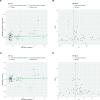Causality of genetically predicted solid cancers on risk of sepsis: insights from Mendelian randomization
- PMID: 40490626
- PMCID: PMC12149036
- DOI: 10.1007/s12672-025-02848-x
Causality of genetically predicted solid cancers on risk of sepsis: insights from Mendelian randomization
Abstract
Objective: Some studies have found that solid cancer and sepsis are linked. The primary objective of this study is to explore this connection further, investigating the causal effect of solid cancer on sepsis by applying Mendelian randomization (MR).
Methods: Using genome-wide association study (GWAS) data from the Medical Research Council-Integrative Epidemiology Unit database, we conducted a bidirectional two-sample Mendelian randomization (MR) analysis to test the causal association between solid cancers (10 GWAS, 1,345,730 samples) and sepsis (2 GWAS, 1,288,566 samples) in European ancestry. In the context of multivariable MR analysis, lifestyle risk factors such as body mass index (BMI) were incorporated, with relevant clinical interventions taken into account.
Results: The two-sample MR analysis suggested a causal relationship between renal cancer and sepsis (OR = 1.051, 95% CI = 1.019-1.085, PIVW = 1.800E-03). Renal cancer (OR = 1.064, 95% CI = 1.011-1.120, PIVW = 1.60E-02), BMI (OR = 1.315, 95% CI = 1.176-1.471, PIVW = 1.25E-06), and smoking (OR = 1.139, 95% CI = 1.009-1.286, PIVW = 3.65E-02) showed a significant association with sepsis in our lifestyle multivariable MR analysis. Reverse MR analysis indicates that sepsis may prevent renal cancer. (OR = 0.924, 95% CI = 0.865 -0.988, PIVW = 2.060E-02).
Conclusions: Our findings suggest renal cancer is correlated with the occurrence of sepsis. This association is partially influenced by BMI and smoking. Unexpectedly, sepsis may act as a protective effect against renal cancer.
Keywords: Cancer; Causal effect; Genetics; Mendelian randomization analysis; Sepsis risk.
© 2025. The Author(s).
Conflict of interest statement
Declarations. Ethics approval and consent to participate: Our analysis used publicly available genome-wide association study (GWAS) summary statistics. No new data were collected, and no new ethical approval was required. Consent for publication: Not applicable. Competing interests: The authors declare no competing interests.
Figures





Similar articles
-
The association between testosterone, estradiol, estrogen sulfotransferase and idiopathic pulmonary fibrosis: a bidirectional mendelian randomization study.BMC Pulm Med. 2024 Sep 3;24(1):435. doi: 10.1186/s12890-024-03198-0. BMC Pulm Med. 2024. PMID: 39227879 Free PMC article.
-
Association between Dried Fruit Intake and DNA Methylation: A Multivariable Mendelian Randomization Analysis.J Nutr Health Aging. 2023;27(11):1132-1139. doi: 10.1007/s12603-023-2030-x. J Nutr Health Aging. 2023. PMID: 37997736
-
Association of cancers with the occurrence and 28-day mortality of sepsis: a mendelian randomization and mediator analysis.Sci Rep. 2025 Feb 15;15(1):5600. doi: 10.1038/s41598-025-89354-w. Sci Rep. 2025. PMID: 39955316 Free PMC article.
-
Causal effects of genetically determined metabolites on cancers included lung, breast, ovarian cancer, and glioma: a Mendelian randomization study.Transl Lung Cancer Res. 2022 Jul;11(7):1302-1314. doi: 10.21037/tlcr-22-34. Transl Lung Cancer Res. 2022. PMID: 35958335 Free PMC article.
-
Association of autoimmune diseases with the occurrence and 28-day mortality of sepsis: an observational and Mendelian randomization study.Crit Care. 2023 Dec 5;27(1):476. doi: 10.1186/s13054-023-04763-5. Crit Care. 2023. PMID: 38053214 Free PMC article.
References
-
- Bray F, Laversanne M, Sung H, Ferlay J, Siegel RL, Soerjomataram I, et al. Global cancer statistics 2022: GLOBOCAN estimates of incidence and mortality worldwide for 36 cancers in 185 countries. CA Cancer J Clin. 2024;74(3):229–63. - PubMed
-
- Mirouse A, Vigneron C, Llitjos JF, Chiche JD, Mira JP, Mokart D. Sepsis and cancer: an interplay of friends and foes. Am J Respir Crit Care Med. 2020;202(12):1625–35. - PubMed
-
- Danai PA, Moss M, Mannino DM, Martin GS. The epidemiology of sepsis in patients with malignancy. Chest. 2006;129(6):1432–40. - PubMed
Grants and funding
- 82072221 to K.Z./National Natural Science Foundation of China
- 82072221 to K.Z./National Natural Science Foundation of China
- 82072221 to K.Z./National Natural Science Foundation of China
- 82072221 to K.Z./National Natural Science Foundation of China
- 82072221 to K.Z./National Natural Science Foundation of China
- LZ22H150002 to K.Z./Natural Science Foundation of Zhejiang Province
- LZ22H150002 to K.Z./Natural Science Foundation of Zhejiang Province
- LZ22H150002 to K.Z./Natural Science Foundation of Zhejiang Province
- LZ22H150002 to K.Z./Natural Science Foundation of Zhejiang Province
- LZ22H150002 to K.Z./Natural Science Foundation of Zhejiang Province
LinkOut - more resources
Full Text Sources
